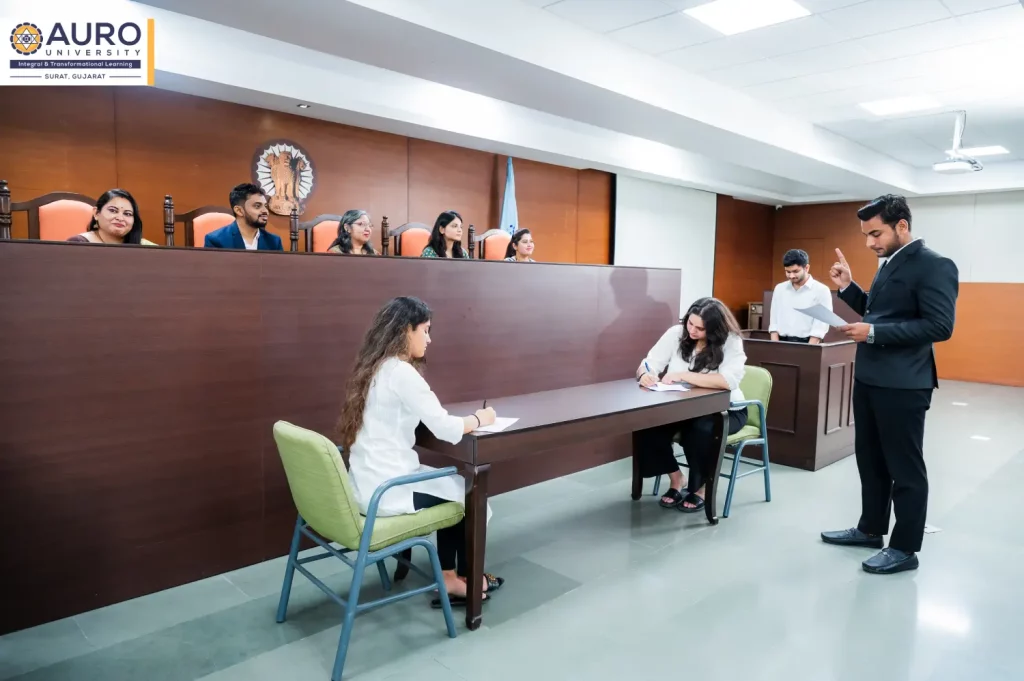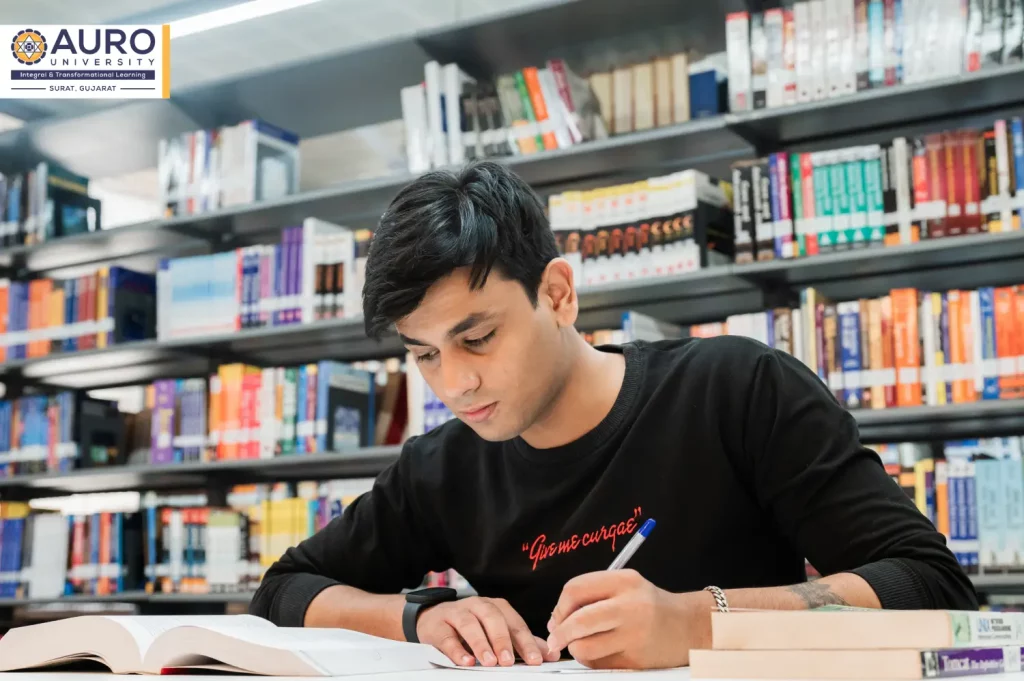In recent years, electronic communication has increasingly replaced traditional face-to-face conversations and written letters. With over two billion users, WhatsApp is now one of the most popular messaging apps worldwide, used extensively for both personal and professional communication.
As a result, WhatsApp messages are often presented as evidence in court cases, but proving their authenticity involves careful adherence to legal and technical procedures. For law students at one of the best law colleges in Gujarat, understanding how to prove WhatsApp messages as evidence is essential for modern legal practice.
Governing Laws for Electronic Evidence:
In India, electronic evidence includes digital data like emails, text messages and social media posts. Such evidence is admissible in court if specific conditions are met. The primary laws governing electronic evidence are the Indian Evidence Act, 1872, and the Information Technology (IT) Act, 2000.
- Indian Evidence Act, Sections 65A and 65B: These sections specify how electronic records, such as WhatsApp messages, can be used as evidence in court. Section 65A recognizes electronic records as valid evidence, while Section 65B outlines conditions for admitting these records.
- IT Act, Section 2(1)(t): This section defines an “electronic record” as any data or information generated, received, or stored electronically. This includes WhatsApp messages, making them legally recognized as electronic evidence.
Admissibility of WhatsApp Messages:
Since WhatsApp messages qualify as electronic records, they fall under Sections 65A and 65B of the Indian Evidence Act. This means they are admissible in court if specific requirements are met, including obtaining a Section 65B certificate.
Section 65B of the Indian Evidence Act
Section 65B(1) states that any information in an electronic record printed, stored or copied onto magnetic or optical media by a computer is considered a document. However, this is valid only if the conditions under Section 65B(2) are satisfied. For instance, the computer producing the record must have been regularly used for storing information, and it must have functioned correctly during that time. Furthermore, Section 65B(4) mandates a certificate confirming the authenticity of the electronic record. This certificate is essential for presenting WhatsApp messages as evidence.

Steps to Prove WhatsApp Messages in Court:
To use WhatsApp messages in court, follow these steps:
- Collection and Preservation
- Screen Captures: Taking screenshots is one way to preserve WhatsApp messages, though they alone may not be sufficient, as they can be easily altered.
- Exporting Chats: WhatsApp allows users to export chat histories, which can be saved as a text file or email. However, this data must be authenticated.
- Forensic Imaging: Forensic experts can create an exact copy of the mobile device containing WhatsApp messages, preserving data in its original state.
- Obtaining a Section 65B Certificate
- Who Can Issue: This certificate can be issued by someone responsible for managing the device that generated the message or a person with authority over that device.
- Content of the Certificate: The certificate should state that the information was obtained from a properly functioning device during regular business operations and that the data remains unaltered.
- Timing: It is best to get this certificate when collecting the evidence to avoid issues later.
- Submission of Evidence in Court
- Physical Submission: Printouts of the messages, along with the Section 65B certificate, can be submitted in court. These printouts should be legible and include relevant details like timestamps and sender information.
- Digital Submission: Courts may allow digital submissions of the evidence, such as on a USB drive, along with the certificate.
- Cross-Examination and Verification
- Cross-Examination of Witnesses: The person who issued the certificate or gathered the evidence might need to testify, explaining the collection and preservation methods.
- Forensic Examination: If the messages’ authenticity is questioned, the court might order a forensic examination to confirm if they were altered.
Key Cases and Judicial Interpretations:
Several significant cases in Indian law have shaped the standards for admitting electronic evidence, which emphasizes why studying law from one of the law colleges in Gujarat is important, including WhatsApp messages, in court.
- State (NCT of Delhi) v. Navjot Sandhu (2005): Initially, the Supreme Court permitted electronic records to be admitted without strict adherence to Section 65B requirements, provided a competent witness could verify their accuracy.
- Anvar P.V. v. P.K. Basheer (2014): This landmark judgment clarified that electronic evidence must have a Section 65B certificate to be admissible, setting a stricter standard.
- Arjun Panditrao Khotkar v. Kailash Kushanrao Gorantyal (2020): The Supreme Court reaffirmed that the Section 65B certificate is mandatory for admitting electronic evidence unless the original record is produced in court.
Challenges in Proving WhatsApp Messages
Proving WhatsApp messages in court involves multiple challenges, especially for those just beginning their legal studies at one of the best law colleges in Gujarat:
- Tampering and Manipulation: Messages can be edited, deleted, or even fabricated, raising doubts about their authenticity. Screenshots, for example, are easy to alter, which can complicate evidence validation.
- Technical Complexities: Proper collection and preservation are essential to maintain data integrity, but these technical steps can be complicated.
- Legal Hurdles: Obtaining an accurate Section 65B certificate and meeting strict legal requirements for admissibility can be challenging.
- Privacy Concerns: WhatsApp messages often contain sensitive information, so presenting them in court can risk privacy, especially if unrelated third parties are involved.

Best Practices for Proving WhatsApp Messages
For law students aiming to practice at one of the best law colleges in Gujarat, here are some best practices to ensure WhatsApp messages are effectively proved in court:
- Early Collection of Evidence: Gather WhatsApp messages as evidence early in the legal process to reduce the chance of tampering.
- Use of Forensic Experts: Engaging forensic experts for collecting and preserving evidence strengthens its credibility.
- Timely Section 65B Certificate: Obtain the certificate promptly to avoid issues later in court.
- Preparation for Cross-Examination: Be prepared to explain the technical aspects of evidence and the legal requirements during cross-examination.
- Privacy Protection: Protect privacy and confidentiality by redacting irrelevant sensitive information and considering protective orders where needed.
For students and professionals studying at the best law colleges in Gujarat, proving WhatsApp messages as evidence is an increasingly important skill. With the Indian Evidence Act and IT Act providing a legal framework, it is possible to admit WhatsApp messages in court.
However, collecting, preserving, and presenting these messages require technical knowledge and legal expertise. By following best practices from one of the law colleges in Gujarat, such as obtaining a Section 65B certificate promptly and engaging forensic experts, WhatsApp messages can serve as strong evidence in legal proceedings while respecting privacy and meeting admissibility standards.





